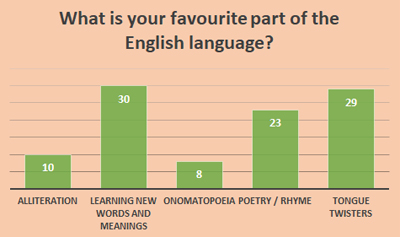Favourite Part of English Language
Which Part of English do Children Like Most?

The English language is spoken by almost a billion people around the world. It is a language of trade, and of politics. It is also a complicated one, with more words than most languages, and some strange grammatical rules. It is said by many to be the hardest language to learn.
But English is also a language of literature and of poetry. William Shakespeare is perhaps its most renowned user, famous around the world for his plays, his poems and for the words he introduced to the language. Most of us can appreciate the beauty of his words.
This got us thinking, here at Education Quizzes. What do children like the most about English? So, for this week’s survey we decided to ask them. We posed the following question to 1,330 children between the ages of 5 and 17: What is your favourite part of the English language?
We offered a choice of five answers: Alliteration, Learning new words and meanings, Onomatopoeia, Poetry / Rhyme, and Tongue twisters. Here is what we discovered…
- 8% of children like onomatopoeia (words that sound like the thing they describe) best
- 10% prefer alliteration (the same sound at the beginning of words)
- 23% opted for poetry and rhyme
- 29% like tongue twisters best
- 30% said that learning new words and meanings was what they liked most
These are interesting results. It seems that children just love to learn. And learning new words is beneficial to their education. It’s always good to have a wide vocabulary.
Onomatopoeia
Perhaps the reason that onomatopoeia did so poorly in the survey may be due to some children not knowing what the word means. I’m sure there are adults who don’t know either! So, to clarify, an onomatopoeia is a word which sounds like what it means. Here are some examples:
- Crash
- Squirt
- Whoosh
- Purr
- Jangle
Onomatopoeic words capture sounds so they can be used to really bring writing to life. They are a great tool authors use to fire the imagination of their readers.
Alliteration
Alliteration is another word that many might not know the meaning of. For those of us in the dark, alliteration is when two or more words start with the same sound, for example, “some sweet sausages”.
Alliteration was once the preferred form of poetry but has now been replace by rhyme. Here’s an alliterative poem:
Closed my lids, and kept them close,
And the balls like pulses beat;
For the sky and the sea, and the sea and the sky
Lay like a load on my weary eye,
And the dead were at my feet”
(From “The Raven” by Edgar Allan Poe)
Rhyme
I’m sure all of us are familiar with rhyme. It’s when two or more words have similar-sounding final syllables. Here are some example rhyming words:
- River - giver
- Rain - Spain
- Cake - awake
- Moon - soon
- Love - above
Rhyme is a favourite tool of poets. It can make words sound more appealing, and also more memorable. Here’s an example of a poem which uses rhyme:
Hold fast to dreams, for if dreams die
Life is a broken-winged bird that cannot fly.
Hold fast to dreams for when dreams go
Life is a barren field frozen with snow.
(“Dreams” by Langston Hughes)
Tongue Twisters
Tongue twisters did very well in the survey. They came second, just one point behind first place. Not surprising – they have been a favourite in playgrounds for hundreds of years. I’m sure you know several yourself. Here’s perhaps the most famous tongue twister of them all:
Peter Piper picked a peck of pickled peppers,
A peck of pickled peppers Peter Piper picked.
If Peter Piper picked a peck of pickled peppers,
Where’s the peck of pickled peppers Peter Piper picked?
They may seem like nonsense, but tongue twisters are great ways to practice elocution, pronunciation and fluency.
New Words
English is an evolving language. New words pop into existence every day. Some don’t catch on and disappear into obscurity. Some hang around for a few years or decades before making their departure. And some are here to stay.
It is estimated that 4,000 new words are added to the language every year. Shakespeare himself is credited with creating over 2,000 new words. But what are the new words of today? Here’s a selection of words added to the Oxford English Dictionary in 2020:
- bakgat, adj. - very good, excellent
- pitchy, adj. - unsteadily pitched singer’s voice
- griefer, n. – an online gamer who enjoys spoiling the game for others
- codespeak, n. - deliberately ambiguous language, jargon
- transatlanticist, n. - a North American
There are 171,476 words currently in use in English. That is a lot of words to learn the meanings of (for comparison, there are 50,000 words used in Latin). But, with the appetite and love for learning revealed by this survey, I think children today are up to the job.
More Survey ResultsFull Results of our "Favourite Part of English” Survey
Here are the results from the 1,330 children who answered our question "What is your favourite part of the English language?". The survey was conducted in the week ending December 13th, 2020.
| What is your favourite part of the English language? | Percentage of Respondents |
|---|---|
| Alliteration | 10% |
| Learning new words and meanings | 30% |
| Onomatopoeia | 8% |
| Poetry / Rhyme | 23% |
| Tongue twisters | 29% |



